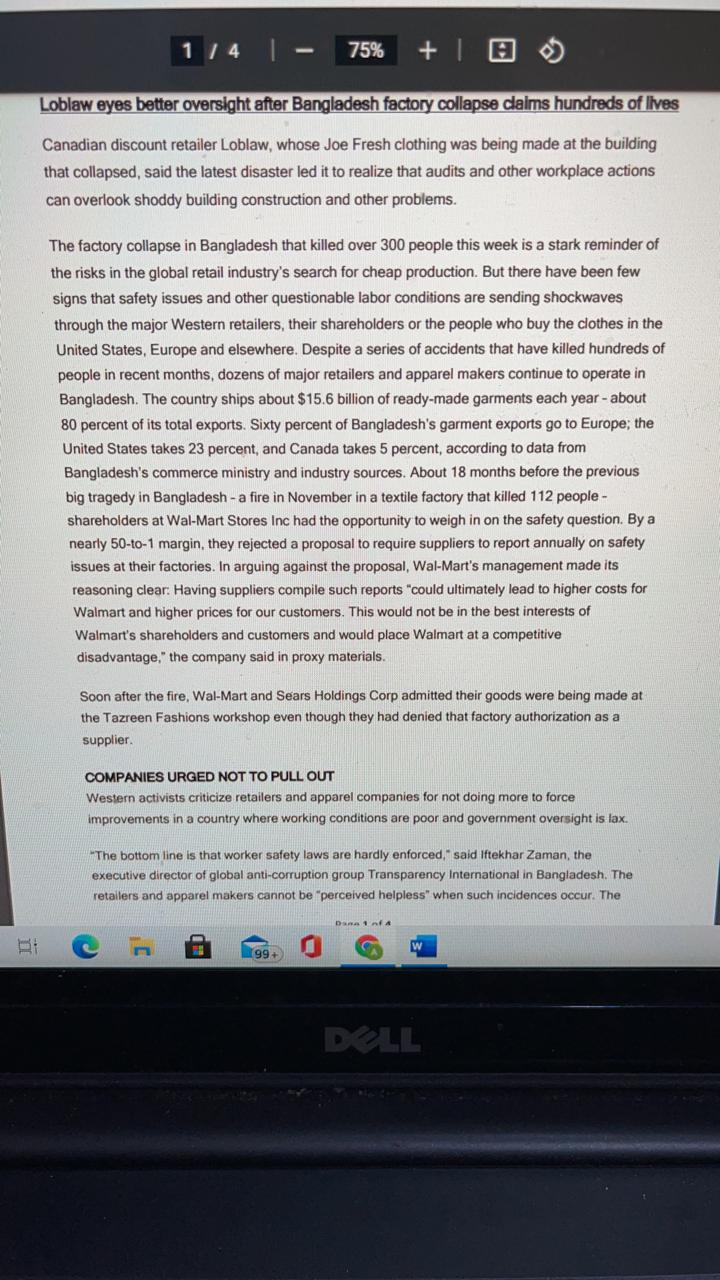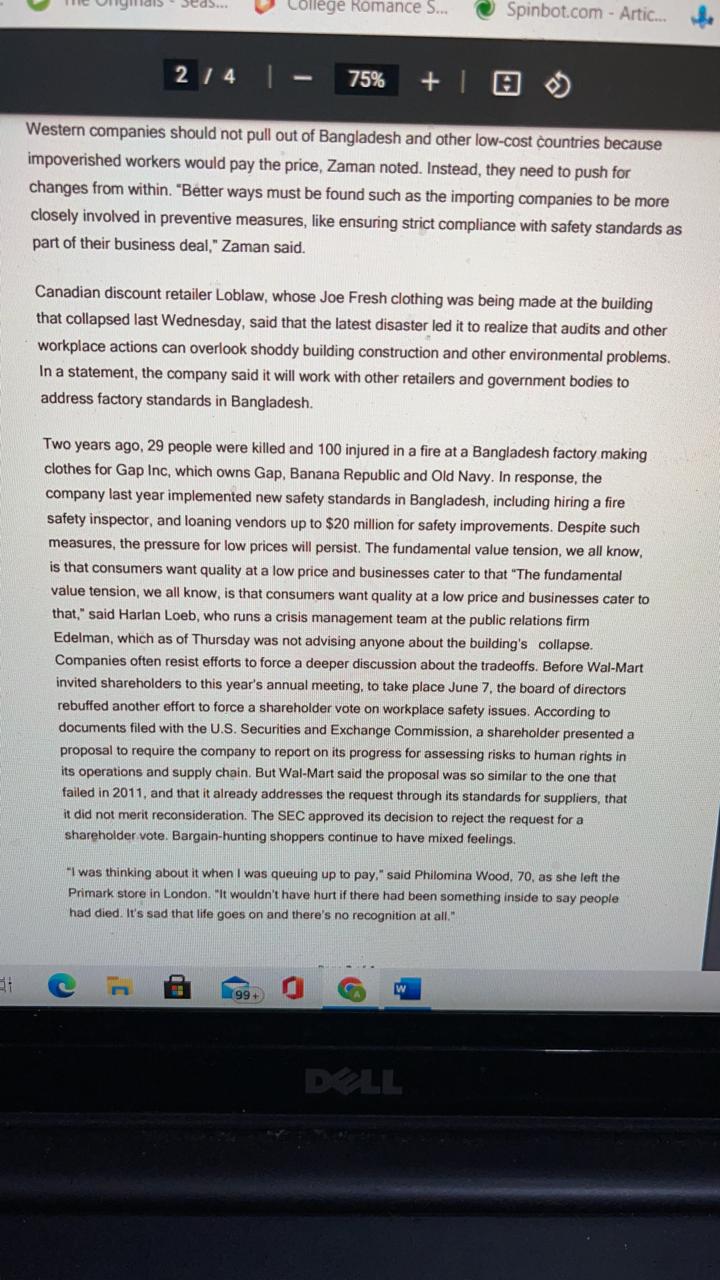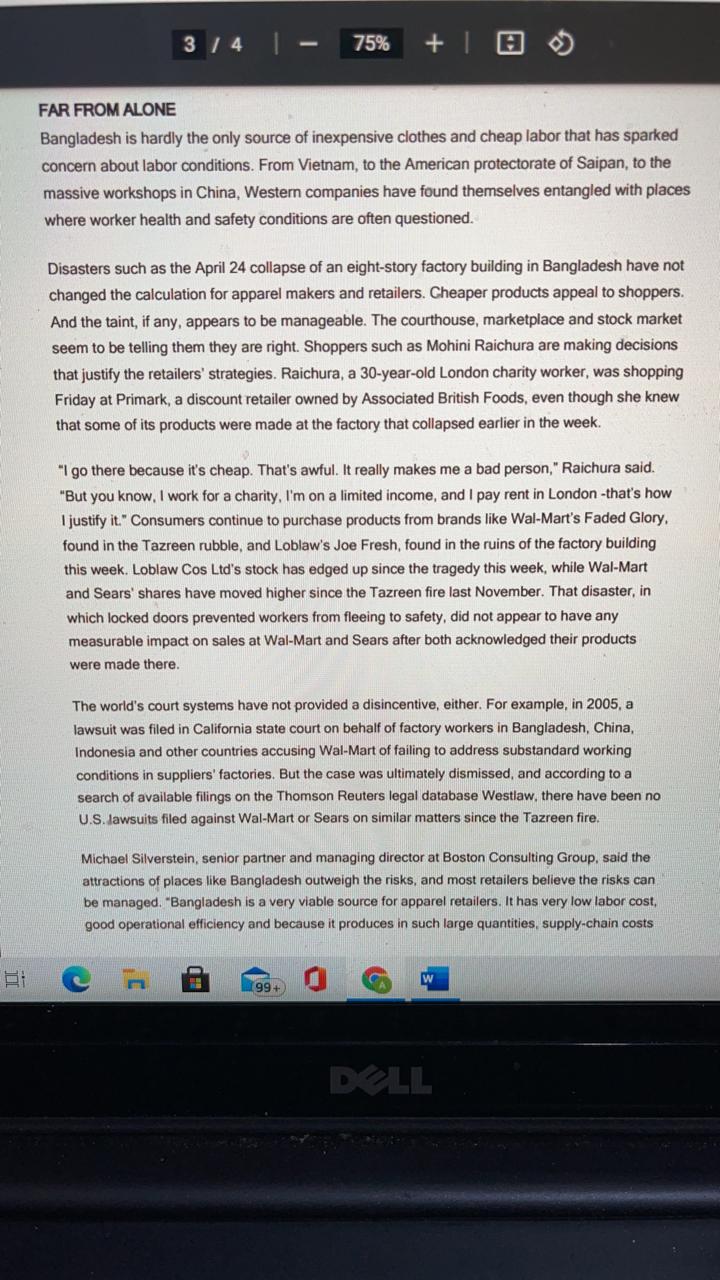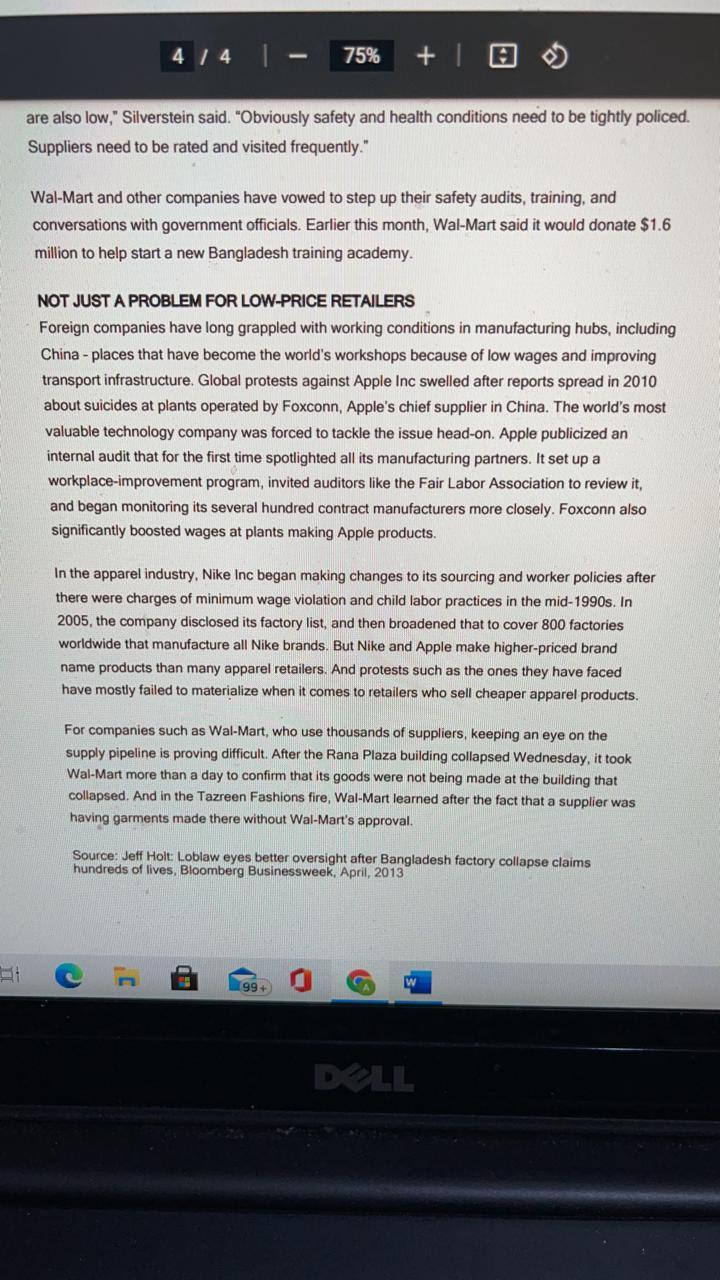Hi can you please explain this ques. and please explain it in detail, not in just brief. Case study is being attached, thank you and appreciate the help.
1. Identify the different retail stores involved in the low standard factory operation in Bangladesh, state the issues and how they have solved them. Explain why Bangladesh is an attractive production site for retailers.
1 - 75% + 1 Loblaw eyes better oversight after Bangladesh factory collapse claims hundreds of lives Canadian discount retailer Loblaw, whose Joe Fresh clothing was being made at the building that collapsed, said the latest disaster led it to realize that audits and other workplace actions can overlook shoddy building construction and other problems. The factory collapse in Bangladesh that killed over 300 people this week is a stark reminder of the risks in the global retail industry's search for cheap production. But there have been few signs that safety issues and other questionable labor conditions are sending shockwaves through the major Western retailers, their shareholders or the people who buy the clothes in the United States, Europe and elsewhere. Despite a series of accidents that have killed hundreds of people in recent months, dozens of major retailers and apparel makers continue to operate in Bangladesh. The country ships about $15.6 billion of ready-made garments each year - about 80 percent of its total exports. Sixty percent of Bangladesh's garment exports go to Europe; the United States takes 23 percent, and Canada takes 5 percent, according to data from Bangladesh's commerce ministry and industry sources. About 18 months before the previous big tragedy in Bangladesh - a fire in November in a textile factory that killed 112 people - shareholders at Wal-Mart Stores Inc had the opportunity to weigh in on the safety question. By a nearly 50-to-1 margin, they rejected a proposal to require suppliers to report annually on safety issues at their factories. In arguing against the proposal, Wal-Mart's management made its reasoning clear: Having suppliers compile such reports "could ultimately lead to higher costs for Walmart and higher prices for our customers. This would not be in the best interests of Walmart's shareholders and customers and would place Walmart at a competitive disadvantage," the company said in proxy materials. Soon after the fire, Wal-Mart and Sears Holdings Corp admitted their goods were being made at the Tazreen Fashions workshop even though they had denied that factory authorization as a supplier. COMPANIES URGED NOT TO PULL OUT Western activists criticize retailers and apparel companies for not doing more to force improvements in a country where working conditions are poor and government oversight is lax. "The bottom line is that worker safety laws are hardly enforced," said iftekhar Zaman, the executive director of global anti-corruption group Transparency International in Bangladesh. The retailers and apparel makers cannot be "perceived helpless" when such incidences occur. The Dana 1 of a 199 + O DELLCollege Romance S.. Spinbot.com - Artic... &. 2 / 4 75% + Western companies should not pull out of Bangladesh and other low-cost countries because impoverished workers would pay the price, Zaman noted. Instead, they need to push for changes from within. "Better ways must be found such as the importing companies to be more closely involved in preventive measures, like ensuring strict compliance with safety standards as part of their business deal," Zaman said. Canadian discount retailer Loblaw, whose Joe Fresh clothing was being made at the building that collapsed last Wednesday, said that the latest disaster led it to realize that audits and other workplace actions can overlook shoddy building construction and other environmental problems. In a statement, the company said it will work with other retailers and government bodies to address factory standards in Bangladesh. Two years ago, 29 people were killed and 100 injured in a fire at a Bangladesh factory making clothes for Gap Inc, which owns Gap, Banana Republic and Old Navy. In response, the company last year implemented new safety standards in Bangladesh, including hiring a fire safety inspector, and loaning vendors up to $20 million for safety improvements. Despite such measures, the pressure for low prices will persist. The fundamental value tension, we all know, is that consumers want quality at a low price and businesses cater to that "The fundamental value tension, we all know, is that consumers want quality at a low price and businesses cater to that," said Harlan Loeb, who runs a crisis management team at the public relations firm Edelman, which as of Thursday was not advising anyone about the building's collapse. Companies often resist efforts to force a deeper discussion about the tradeoffs. Before Wal-Mart invited shareholders to this year's annual meeting, to take place June 7, the board of directors rebuffed another effort to force a shareholder vote on workplace safety issues. According to documents filed with the U.S. Securities and Exchange Commission, a shareholder presented a proposal to require the company to report on its progress for assessing risks to human rights in its operations and supply chain, But Wal-Mart said the proposal was so similar to the one that failed in 2011, and that it already addresses the request through its standards for suppliers, that it did not merit reconsideration. The SEC approved its decision to reject the request for a shareholder vote. Bargain-hunting shoppers continue to have mixed feelings. "I was thinking about it when I was queuing up to pay," said Philomina Wood, 70, as she left the Primark store in London. "It wouldn't have hurt if there had been something inside to say people had died. It's sad that life goes on and there's no recognition at all." 199+ DELL3 4 75% + 1 FAR FROM ALONE Bangladesh is hardly the only source of inexpensive clothes and cheap labor that has sparked concern about labor conditions. From Vietnam, to the American protectorate of Saipan, to the massive workshops in China, Western companies have found themselves entangled with places where worker health and safety conditions are often questioned. Disasters such as the April 24 collapse of an eight-story factory building in Bangladesh have not changed the calculation for apparel makers and retailers. Cheaper products appeal to shoppers. And the taint, if any, appears to be manageable. The courthouse, marketplace and stock market seem to be telling them they are right. Shoppers such as Mohini Raichura are making decisions that justify the retailers' strategies. Raichura, a 30-year-old London charity worker, was shopping Friday at Primark, a discount retailer owned by Associated British Foods, even though she knew that some of its products were made at the factory that collapsed earlier in the week. "I go there because it's cheap. That's awful. It really makes me a bad person," Raichura said. "But you know, I work for a charity, I'm on a limited income, and I pay rent in London -that's how I justify it." Consumers continue to purchase products from brands like Wal-Mart's Faded Glory. found in the Tazreen rubble, and Loblaw's Joe Fresh, found in the ruins of the factory building this week. Loblaw Cos Lid's stock has edged up since the tragedy this week, while Wal-Mart and Sears' shares have moved higher since the Tazreen fire last November. That disaster, in which locked doors prevented workers from fleeing to safety, did not appear to have any measurable impact on sales at Wal-Mart and Sears after both acknowledged their products were made there. The world's court systems have not provided a disincentive, either. For example, in 2005, a lawsuit was filed in California state court on behalf of factory workers in Bangladesh, China, Indonesia and other countries accusing Wal-Mart of failing to address substandard working conditions in suppliers' factories. But the case was ultimately dismissed, and according to a search of available filings on the Thomson Reuters legal database Westlaw, there have been no U.S. lawsuits filed against Wal-Mart or Sears on similar matters since the Tazreen fire. Michael Silverstein, senior partner and managing director at Boston Consulting Group, said the attractions of places like Bangladesh outweigh the risks, and most retailers believe the risks can be managed. "Bangladesh is a very viable source for apparel retailers. It has very low labor cost, good operational efficiency and because it produces in such large quantities, supply-chain costs 199 + O DELL1 4 75% + 1 are also low," Silverstein said. "Obviously safety and health conditions need to be tightly policed. Suppliers need to be rated and visited frequently." Wal-Mart and other companies have vowed to step up their safety audits, training, and conversations with government officials. Earlier this month, Wal-Mart said it would donate $1.6 million to help start a new Bangladesh training academy. NOT JUST A PROBLEM FOR LOW-PRICE RETAILERS Foreign companies have long grappled with working conditions in manufacturing hubs, including China - places that have become the world's workshops because of low wages and improving transport infrastructure. Global protests against Apple Inc swelled after reports spread in 2010 about suicides at plants operated by Foxconn, Apple's chief supplier in China. The world's most valuable technology company was forced to tackle the issue head-on. Apple publicized an internal audit that for the first time spotlighted all its manufacturing partners. It set up a workplace-improvement program, invited auditors like the Fair Labor Association to review it, and began monitoring its several hundred contract manufacturers more closely. Foxconn also significantly boosted wages at plants making Apple products. In the apparel industry, Nike Inc began making changes to its sourcing and worker policies after there were charges of minimum wage violation and child labor practices in the mid-1990s. In 2005, the company disclosed its factory list, and then broadened that to cover 800 factories worldwide that manufacture all Nike brands. But Nike and Apple make higher-priced brand name products than many apparel retailers. And protests such as the ones they have faced have mostly failed to materialize when it comes to retailers who sell cheaper apparel products. For companies such as Wal-Mart, who use thousands of suppliers, keeping an eye on the supply pipeline is proving difficult. After the Rana Plaza building collapsed Wednesday, it took Wal-Mart more than a day to confirm that its goods were not being made at the building that collapsed. And in the Tazreen Fashions fire, Wal-Mart learned after the fact that a supplier was having garments made there without Wal-Mart's approval. Source: Jeff Holt: Loblaw eyes better oversight after Bangladesh factory collapse claims hundreds of lives, Bloomberg Businessweek, April, 2013 99+ O DELL










